|
|
|
Sort Order |
|
|
|
Items / Page
|
|
|
|
|
|
|
| Srl | Item |
| 1 |
ID:
104133
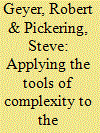

|
|
|
|
|
| Publication |
2011.
|
| Summary/Abstract |
Increasingly, complexity-based thinking is challenging the dominant rationalist, realist and reductionist international relations (IR) framework. However, to move this challenge beyond the academic realm and into the day-to-day world of policy, complexity thinkers must begin to develop useful tools for policy practitioners. This paper attempts to address this issue by demonstrating the weaknesses and limits of one traditional IR tool (X-Y graphic visualizations) and the strengths of complexity tools (the fitness landscape and range of complexity outcomes). To demonstrate these arguments we examine how fitness landscapes can be used to reinterpret traditional perspectives on development and conflict and make difficult problems more approachable through three-dimensional visualizations.
|
|
|
|
|
|
|
|
|
|
|
|
|
|
|
|
| 2 |
ID:
103889
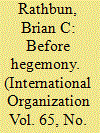

|
|
|
|
|
| Publication |
2011.
|
| Summary/Abstract |
Rationalist accounts of international cooperation maintain that states create international institutions to solve problems of distrust. They rest on a particular notion of trust, a strategic variety in which states trust based on information about others' interests. I seek to overturn this conventional wisdom. Drawing on social psychology, I point to the importance of generalized trust, an ideological belief about the trustworthiness of others in general. Generalized trust precedes institution-building and serves as a form of anarchical social capital, facilitating diffuse reciprocity and allowing state leaders to commit to multilateralism even in cases that rationalists deem inhospitable to cooperation and without the institutional protections that rationalists expect. In case studies of U.S. policy on the creation of the League of Nations and the United Nations, I demonstrate that generalized trust is necessary for explaining the origins of American multilateralism and the design of these organizations.
|
|
|
|
|
|
|
|
|
|
|
|
|
|
|
|
| 3 |
ID:
097909
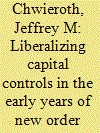

|
|
|
|
|
| Publication |
2010.
|
| Summary/Abstract |
How do crises lead to change? Rationalist approaches to the question that emphasize inexorable structural responses and the pursuit of distributive preferences by newly dominant coalitions, are inadequate because they obscure the social mediation of material events and the pervasive uncertainty that follows destabilization of the precrisis status quo, which constrains actors from fully grasping their distributive preferences. Until uncertainty is reduced, persuasion emerges as a key mechanism of change. Although constructivist approaches emphasize persuasive practices, they have yet to adequately specify the scope conditions underpinning the selection of new ideas. This article goes beyond much of the constructivist focus on domestic legitimacy and static notions of resonance by emphasizing external credibility and dynamic processes of resonance-building by norm entrepreneurs. The author specifies four features-what he calls the four Cs of crisis resolution-that shape the process of idea selection: carriers, composition, crossover appeal, and credibility. Developing these arguments in the case of the early years of New Order Indonesia, the article suggests that whenever a prominent and cohesive group of advocates promotes an idea that has sufficient ideational and distributive appeal and the endorsement of external actors whose seal of approval is perceived as important, intersubjective belief change, and thus institutional and policy change, is more likely.
|
|
|
|
|
|
|
|
|
|
|
|
|
|
|
|
| 4 |
ID:
127351
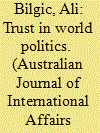

|
|
|
|
|
| Publication |
2014.
|
| Summary/Abstract |
In the discipline of international relations, the concept of trust has been theorised in two ways: the 'rationalist' approach and the 'normative' approach. This article aims to show that these approaches do not adequately reflect how trust operates in world politics and that trust provides a new way of understanding the identity-security nexus in international relations. It is argued that as actors learn to trust each other, this trust-learning process has a transformative effect on their definition of self-interests and identities. The elaborated understanding of trust in the security dilemma is operationalised in terms of the immigration security dilemma.
|
|
|
|
|
|
|
|
|
|
|
|
|
|
|
|
| 5 |
ID:
102442
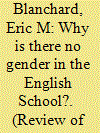

|
|
|
|
|
| Publication |
2011.
|
| Summary/Abstract |
Why has English School theory, even as it has been re-imagined as critical international society theory, ignored the workings of gender in international politics? This article stages an encounter between the English School and feminists in International Relations (IR), first demonstrating the broad compatibility of the two approaches. I argue that to conduct a conversation between English School and IR feminist approaches, it is necessary to reconstruct the English School's three traditions - Realist, Rationalist, and Revolutionist - so as to allow a greater role for gender as a category of analysis. I then review the work of two key English School scholars, Hedley Bull and Barry Buzan with this reconstruction in mind. Finally, I argue that IR theorists who have participated in the recent English School revival should consider integrating gender into its theoretical and research agenda, and show several examples of how a hybrid approach can be brought to bear on the expansion of international society, diplomacy, and human rights.
|
|
|
|
|
|
|
|
|
|
|
|
|
|
|
|
|
|
|
|
|